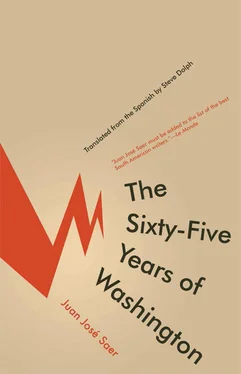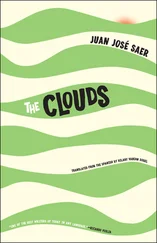Juan José Saer - The Sixty-Five Years of Washington
Здесь есть возможность читать онлайн «Juan José Saer - The Sixty-Five Years of Washington» весь текст электронной книги совершенно бесплатно (целиком полную версию без сокращений). В некоторых случаях можно слушать аудио, скачать через торрент в формате fb2 и присутствует краткое содержание. Год выпуска: 2010, Издательство: Open Letter, Жанр: Современная проза, на английском языке. Описание произведения, (предисловие) а так же отзывы посетителей доступны на портале библиотеки ЛибКат.
- Название:The Sixty-Five Years of Washington
- Автор:
- Издательство:Open Letter
- Жанр:
- Год:2010
- ISBN:нет данных
- Рейтинг книги:3 / 5. Голосов: 1
-
Избранное:Добавить в избранное
- Отзывы:
-
Ваша оценка:
- 60
- 1
- 2
- 3
- 4
- 5
The Sixty-Five Years of Washington: краткое содержание, описание и аннотация
Предлагаем к чтению аннотацию, описание, краткое содержание или предисловие (зависит от того, что написал сам автор книги «The Sixty-Five Years of Washington»). Если вы не нашли необходимую информацию о книге — напишите в комментариях, мы постараемся отыскать её.
The Sixty-Five Years of Washington — читать онлайн бесплатно полную книгу (весь текст) целиком
Ниже представлен текст книги, разбитый по страницам. Система сохранения места последней прочитанной страницы, позволяет с удобством читать онлайн бесплатно книгу «The Sixty-Five Years of Washington», без необходимости каждый раз заново искать на чём Вы остановились. Поставьте закладку, и сможете в любой момент перейти на страницу, на которой закончили чтение.
Интервал:
Закладка:
Why did he hate them so much? A psychoanalytic manifestation , Tomatis diagnosed with flippant disinterest. When your parents are perfect, you are compelled to project the hatred you should feel for them to every member of their class. Unlike Washington who, it seems, hated his father so much that the quota of love he should have felt for him he transferred to the rest of humanity.
The Mathematician was shaking his head: Tsk-tsk-tsk-tsk. . no. Accepting that interpretation would oversimplify things. Casually submitting to the subjective hypothesis means ignoring the valid objective reasons for hating them: for example their enthusiasm and acumen for accumulating wealth and the cruelty they demonstrate in defending it; the egocentric ignorance and compulsive narcissism that isolates them from the rest of the world; and the creepy mimesis they have employed in copying foreign style, first the English and French, later the Americans — one of his uncles, the Mathematician’s, no? had proposed in the thirties that the country transfer power to the English crown; they were poor losers, vindictive, they carried genocide in their blood, bigotry in their souls, and vanity in their hearts, and they were prepared at any moment to annihilate everything they considered heterogeneous to their nature and anything that didn’t reflect, in its features and gestures, the supposed image of what they pretend to be. In a word , the Mathematician always ended up saying after those rhetorical flare-ups, trying to re-establish a balanced and affable tone, in a word, they are uninteresting .
The Mathematician’s bitter, almost rancid hatred for his own class, excepting its expression in the occasional confidence, was almost never displayed in his words or actions, not because he meant to conceal them, but rather from a kind of fatalism — it wasn’t worth wasting time on them, they were not interesting, so why bother spitting in their face when you could spend a lifetime studying Spinoza’s Ethics or the EPR paradox. Nevertheless, some of that hatred occasionally came to the surface, because the Mathematician, who was attentive, polite, respectful, in some cases to the point of affectation, according to Tomatis, when faced with a patrician, with any sort of tycoon, with the nephew of a bishop, or a minister, or a general’s son, could not suppress an ironic genuflection toward what he considered, preemptively and without appeal, the other’s ineptitude. If the encounter took place in the presence of a witness, or someone he respected or admired, that irony was not without cruelty, as though by using it he was trying to differentiate himself from his interlocutor as much as possible. The Mathematician, no? How he’d been marked by the very objects of his distaste! Just look at him, on the central avenue, dressed completely in white, including the moccasins he bought in Florence, with an even tan, tall, blonde, insulated from the imperfection and eventuality of those, like Leto, who observe him from the outside, so much so that his mere presence, his exacting and measured expressions, the apparent culmination of his positive traits, further reinforce Leto’s feeling of exclusion, of awkwardness, of being, not the whim, but the hopeless mistake of Everything.
But they’ve reached the corner, that right angle which, in Hippodamus’s summary calculations, suddenly interrupting the sidewalk and introducing an evident pause for drivers and pedestrians and facilitating orientation, movement, and visibility — describing, as they say, a space that, in fact, has no shape or name — set a conventional order to the mornings in Peiraeus. Shade, gray pavement, the angled sun, cable, cobblestones, cable, gray pavement, angled sun, shade: there they go, without incident or much modification of rhythm or speed, or trajectory moreover, walking down the next sidewalk. The Mathematician says that Washington lifts his head when he hears the triplicate buzzing, somewhat bewildered, and sees the three mosquitos swirling not far from the lamp. Bewildered because the previous summer it had been too dry for the larvae, and later the nymphs, as they call them, of the so-called diptera, to have increased their offspring, or rather, as they say, proliferate. Mosquitos are in fact not uncommon in the area, and if in winter they hit the proverbial road and disappear, later, in the first weeks of November when the heat gets oppressive, if it has rained enough for the larvae and later the nymphs to flourish, the air turns black in the evening and the warm-blooded animals are forced to go around swatting themselves in the head through tenacious, rapacious, and buzzing clouds. People — man, no? human beings, who altogether compose what they call humanity, or rather the sum of individuals since the appearance of the species, as they call it, in, it would seem, east Africa, through a qualitative jump across adjoining evolutionary branches, and the specific attributes they attribute to themselves — man, we were saying, or rather yours truly, the author, was saying, has given it that diminutive or pejorative name for mosca , or fly in Spanish, no doubt following an anatomic classification by size, imprecise enough in any case, but ultimately, in any case, imprecise or not, there’s nothing for it, the naming has to happen. All of this, of course, according to the Mathematician, more or less and always according to Botón, and, according to Botón, I was saying, according to Washington. Thinking about it, no one says this mosquito, everyone says the mosquito, as if it were always the same one and as if, with that synecdoche, as it’s called, we were trying to conceal or, maybe, on the contrary, to suggest, the fundamental problem: one or many? Is it always the same mosquito that attacks every summer night, reincarnated over and over after getting smashed against a white wall, or do new hordes of individuals, pristine and just as transient, avidly sprout up every day, in the swamps, in search of the blood they need, only to, after having been a larva, nymph, an airborne buzzing speck, if they’ve managed to escape the assassin’s hand, propagate, decline, and perish? Is it included among the ones who, definitively, are born and die, or do interchangeable and biodegradable mechanisms successively occupy an eight millimeter entity that bites and buzzes, an invariable essence without contingency or destiny, outside the spatiotemporal melodrama, lacking individual differentiation? Is its function to be someone in life or some anonymous palpitation, absorbed as quickly as it appears by a brilliant, immutable, everlasting, and — even when there are no more little gray bodies to devour — insatiable reality? And prior to that, some say, extrafactually, postemprically, ultramaterially, etc., etc. — ultimately, more or less, according to the Mathematician, definitely not according to Botón, but for sure, he thinks, by way of Botón, according to Washington.
Leto follows the Mathematician’s story, told without pedagogical concessions and without preciousness, with some difficulty, as it seems to only gather order and sense as the clear and well-constructed sentences accumulate, not only for the listener but also, and to an even greater extent, for the speaker, more attentive to the story’s coherence than the listener, insofar as, concentrating on the formation of his sentences, of his concepts, structuring his memories, his interpretations, his fragments of memories and interpretations, the Mathematician is less vulnerable to sensory interference than Leto, for whom the story the Mathematician seems so submerged in and satisfied with is a heterogeneous composition of vague and opaque words he barely pays attention to, and of transparent passages that allow his imagination, turning on and off intermittently, to construct expressive and fleeting images: there was a feast at the house of someone named Basso, in Colastiné, at the end of August, to celebrate Washington’s birthday, and they had started discussing a horse that had stumbled; the Mathematician — it was Tomatis who gave him the nickname — heard about it from Botón the Saturday before on the Paraná ferry, Botón, a guy he has heard about several times but whom he has not had the pleasure of meeting, and then Washington had said that the horse was not an acceptable example for the problem they were discussing — Leto asks himself darkly, without daring to make the case to the Mathematician out of fear that the Mathematician will look down on him a little, what the hell the so-called problem could be — that the mosquito, if Leto understood correctly, would be a more appropriate creature, by reason of its lack of anthropocentric finality, to use as the object of discussion and in fact he, Washington, no? the summer before, after midnight, while he worked on his four lectures — Location, Lineage, Language, Logic — on the Colastiné Indians, had the opportunity to observe three mosquitos that through their singular behavior acquired paradigmatic value and sufficed, better than the horse, burdened as it is with projections, to clarify the debate, all of this, in Leto’s imagination, illustrated with sporadic and fleeting pictures, Basso and Botón picking vegetables at the back of a vague patio on a calm winter afternoon, Beatriz rolling a cigarette, Marcos Rosemberg’s sky-blue car, arriving, undulating and quiet, in front of the house Leto has never seen, the perch and catfish wrapped up in day-old pages from La Región , dipped in oil, Tomatis and the Garay twins, Barco, someone named Dib, who has a mechanics shop, Silvia Cohen, Cohen, someone named Cuello who they call the Centaur because he is half animal, the slow night under the pavilion, behind the house, the winter night that cools, under the mandarins — they stayed, it seems, until the morning, until dawn even, the last of them, and then they went back, excited and drowsy, to the city, in the first light of the sun and the frozen dew, and he, Leto, no? could have gone if he wanted, and moreover, if he had known, he was too close to Tomatis to need an invitation, it was strange that Tomatis hadn’t said anything, maybe because he considered it impossible that he wouldn’t know and that they were so close that it wasn’t worth making the invitation explicit, but ultimately, he had to submit to the evidence: they didn’t invite him.
Читать дальшеИнтервал:
Закладка:
Похожие книги на «The Sixty-Five Years of Washington»
Представляем Вашему вниманию похожие книги на «The Sixty-Five Years of Washington» списком для выбора. Мы отобрали схожую по названию и смыслу литературу в надежде предоставить читателям больше вариантов отыскать новые, интересные, ещё непрочитанные произведения.
Обсуждение, отзывы о книге «The Sixty-Five Years of Washington» и просто собственные мнения читателей. Оставьте ваши комментарии, напишите, что Вы думаете о произведении, его смысле или главных героях. Укажите что конкретно понравилось, а что нет, и почему Вы так считаете.












